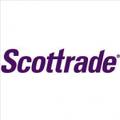In my last post, I tried to close the loop on an earlier post about giving stocks as gifts. As I thought about the subject later, I concluded that I may not have given enough treatment to the idea of picking a discount broker and then opening an account. So I did a little searching and came across a very good summary and 'how to' on the topic. The author was inspired to write the piece, which I've mostly copied below, after he asked a group of thirty colleagues whether or not they were investing outside of their 401ks and learned that none of them were. He later did a survey with his readers and discovered that nearly one fifth of them were not investing outside of their 401k because they didn't know how to get started. Convinced he could help at least some of them overcome the inertia of inaction, he wrote the following:
.........................
...
"What is a Discount Online Broker?
A discount broker differs from a full-service broker in that YOU make the decision on what to invest in and actually execute the trade on your own. That may sound scary at first, but it’s really not so bad.
There are plenty of discount online brokers out there that have helped drive the cost of trading for amateur investors down significantly over the years. A discount online broker is really all you need. Full-service brokers charge exorbitant fees and don’t necessarily have your best interests in mind.
What Can you do Through an Online Broker?
There is a pretty long list of things that you can do through a discount broker, including:
- Putting your money into a money market account. If you leave your cash sitting, most will offer a nominal savings rate, much like a bank.
- Investing in a CD.
- Buying and selling stocks.
- Buying and selling stock options.
- Buying and selling index funds and other mutual funds.
- Buying and selling bonds.
And it’s relatively cheap to do all of them. Stock trades at most discount brokers are $7 or less and many offer no-transaction fee mutual funds, index funds, and ETF’s (more on what each of these is down the road…).
To put it simply: an online broker is a one-stop shop for you to invest your money in just about anything.
The Best Online Brokers: A Comparison
To get started, you need to pick a broker. There are a lot of good ones out there. Most offer relatively cheap trades. Some charge annual fees. Others have high minimum opening contributions. Some have better customer service and trading tools than others. Depending on your situation, the best discount broker for you might vary.
I generally look for accounts that don’t charge BS maintenance or inactivity fees or annual fees. I also look for low costs to trade stocks and funds and an easy to use interface. Here are a few of my favorites (none of these have inactivity or maintenance fees, and only 2 have annual fees):
TradeKing:
- Stocks: $4.95/trade
- Mutual Funds: $9.95/open/close
- Minimum Opening Deposit: $0
- Annual & Inactivity Fees: $0 for IRA’s, $0 for non-retirement accounts, $0 inactivity fee, so long as you maintain a $2,500 balance or you make one in the last 12 months
- Promotion: Reimbursement of up to $150 in transfer fees.
Scottrade:
 I have had investment accounts with Scottrade. They have always maintained a flat $7 trading fee while others have shifted their fees around to gain new customers. One nice thing about Scottrade is that they have over 500 local branches that you can visit.
I have had investment accounts with Scottrade. They have always maintained a flat $7 trading fee while others have shifted their fees around to gain new customers. One nice thing about Scottrade is that they have over 500 local branches that you can visit.- Stocks: $7/trade
- Mutual Funds: $17/open
- Minimum Opening Deposit: $500
- Annual & Inactivity Fees: $0 for IRA’s, $0 for non-retirement accounts, $0 inactivity fee
OptionsHouse:
- Stocks: $4.95/trade
- Mutual Funds: $20/open
- Minimum Opening Deposit: $0
- Annual & Inactivity Fees: $0 for IRA’s, $0 for non-retirement accounts, $0 inactivity fee
Vanguard:
 My 401K is housed with Vanguard. What I really like about them is they have an extensive list of very cheap index funds and ETF’s under their brand and they don’t charge you for trading in and out of them. If you want to invest in their index funds and ETF’s and have a large enough balance to avoid the $20 annual fee, then Vanguard is a great choice.
My 401K is housed with Vanguard. What I really like about them is they have an extensive list of very cheap index funds and ETF’s under their brand and they don’t charge you for trading in and out of them. If you want to invest in their index funds and ETF’s and have a large enough balance to avoid the $20 annual fee, then Vanguard is a great choice.- Stocks: $7/trade (lower on higher value accounts), branded ETF’s & index funds are free
- Mutual Funds: $35, but account tier could make it lower (if you go with Vanguard, just invest in their funds for free as they have the best index funds and ETF’s out there)
- Minimum Opening Deposit: $0
- Annual & Inactivity Fees: Vanguard charges a $20 account fee on IRA’s and other accounts if you have less than $50,000 in assets. If you have more or elect to receive electronic statements, there are no fees. There are also $0 inactivity fees.
Schwab:
 Much like Vanguard, Schwab carries a number of low cost branded ETF’s that they don’t charge you to trade in and out of. Their trading prices are otherwise the highest of the group, at $8.95 each and $76 to open buy mutual funds that are not their brand. Don’t go with Schwab unless you intend in investing in their funds.
Much like Vanguard, Schwab carries a number of low cost branded ETF’s that they don’t charge you to trade in and out of. Their trading prices are otherwise the highest of the group, at $8.95 each and $76 to open buy mutual funds that are not their brand. Don’t go with Schwab unless you intend in investing in their funds.- Stocks: $8.95/trade
- Mutual Funds: $76/open (excluding Schwab funds, which are free)
- Minimum Opening Deposit: $1,000
- Annual & Inactivity Fees: $0 for IRA’s, $0 for non-retirement accounts, $0 inactivity fee
How to Start an Online Broker Account
Now that you’ve picked out a broker, you’re probably wondering what steps you need to take to actually open an account. Check out the minimum opening deposits required, which I listed in the previous section. Note that buying into a mutual fund is usually more prohibitive than actually opening your broker account. Many mutual funds require you to have an opening investment of $1,000 to $2,500. Stocks and ETF’s don’t have these requirements.
Once you have that sorted out, the steps are generally as follows:
- Create a login and password.
- Choose the type of account you want. For most of you, it will be an individual investment account (non-retirement), a traditional IRA, or a Roth IRA. You’ll then be asked whether this is a cash or margin account. Since trading on margin is risky, you’ll want to select ‘cash’ 99.99% of the time.
- You’ll then have to fill out a ton of personal information about yourself including marital and income status, your social security, previous investing history, etc. This information is required by federal law when you start a new broker account, so everyone has to do it, despite how invasive it may seem.
- You’ll have to fund your account. Most online brokers allow you to do this in a few different ways: via ACH withdrawal from a bank account (usually free to do), via a wire transfer (your bank usually charges for this), via a transfer from another broker, or via check. Note that most, if not all, brokers accept cash or other form of payment.
- After you fund your account, there is usually a clearing period of up to a week for a background check and for the funds to clear.
- That’s it. As soon as your funds are cleared, you’re ready to invest!......
..........................
I 'd have to say that's a pretty good summary whether you're among the 20% who just lack the knowledge or you are among those who are already in but may be paying more than you should. And even if you're one of those who might not be ready yet, the above information can serve as a pocket reference guide when you are.
KM
No comments:
Post a Comment